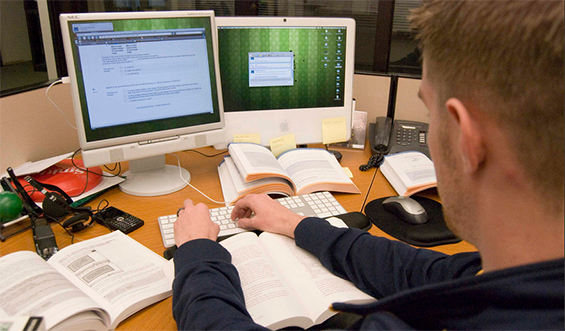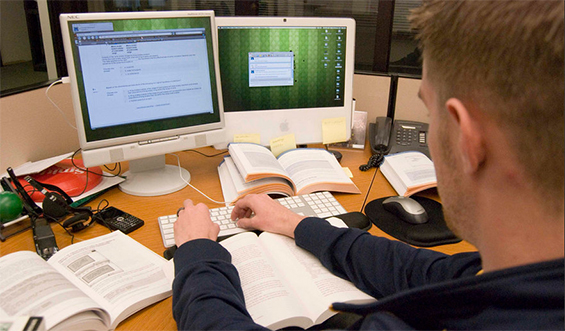
Researchers at Harvard University and the Massachusetts Institute of Technology have discovered that some users of massive open online courses (MOOCs) are using multiple accounts to figure out the correct answers for tests so that they can get perfect scores on their main account.
The institutions discovered cheating after noticing that some users were answering test questions “faster than humanly possible.” They found that some users would register multiple accounts so they could take the test multiple times and figure out the correct answers. The method was dubbed CAMEO cheating, which stands for “Copying Answers Using Multiple Existences Online.”
Researchers Isaac Chuang and Curtis Northcutt of MIT and Andrew Ho of Harvard published a paper on the new cheating method, writes Laura Krantz of the Boston Globe. Chuang, who is a professor of electrical engineering and physics and a Senior Associate Dean of Digital Learning, and Ho, who teaches in Harvard’s Graduate School of Education, analyzed 1.9 million students from edX, a MOOC platform by Harvard and MIT, between 2012 and 2015.
Ho said that CAMEO cheating is systematic and egregious:
[This is a] method of cheating that allows you to acquire a certification for a course in an hour, which is not possible through conventional cheating approaches. This is cheating of a different kind.
This is not an isolated incident of copying on part of one assignment. This is the wholesale falsification of a certificate.
1.3% of edX’s earned certificates, or 1,237 of them, were obtained using this method, writes Barb Darrow of Fortune. Most of those who cheated CAMEO-style earned 20 or more certificates, and it was more prevalent in government, health, and social science courses than in science, technology, and math classes. Most of these types of cheaters were young males outside the US with less previous education than their peers. The countries with the highest rates of CAMEO cheating were Albania, Indonesia, and Serbia.
This has serious implications for MOOCs, especially those for which universities are giving students credit. Chuang said:
If learners in some online courses are circumventing the learning process and obtaining certification without going through the traditional routes of assessment and feedback, then the certification does not necessarily imply that they learned anything. This could seriously devalue MOOC certification.
To reach these conclusions, they created a series of filters to identify CAMEO cheating that identify pairs of users in which one submits the correct answer quickly after the other submits an incorrect one, pairs in which one is interested in certification and the other is not, and pairs who share an IP address. Another filter excludes people on shared routers, like those in cafes and other public spaces, which might generate false positives, writes Dian Schaffhauser of Campus Technology.
The researchers suggest solutions like randomizing questions, and not releasing the correct answers until after assignments are due.
Abby Abazorius of MIT news quoted Chuang on MOOCs’ anti-fraud possibilities:
One of the most interesting lessons from the paper is that there are ways to mitigate cheating that are straightforward and implementable by the teams creating online course content. We also expect platform improvements, such as virtual proctoring, to help reduce cheating.




